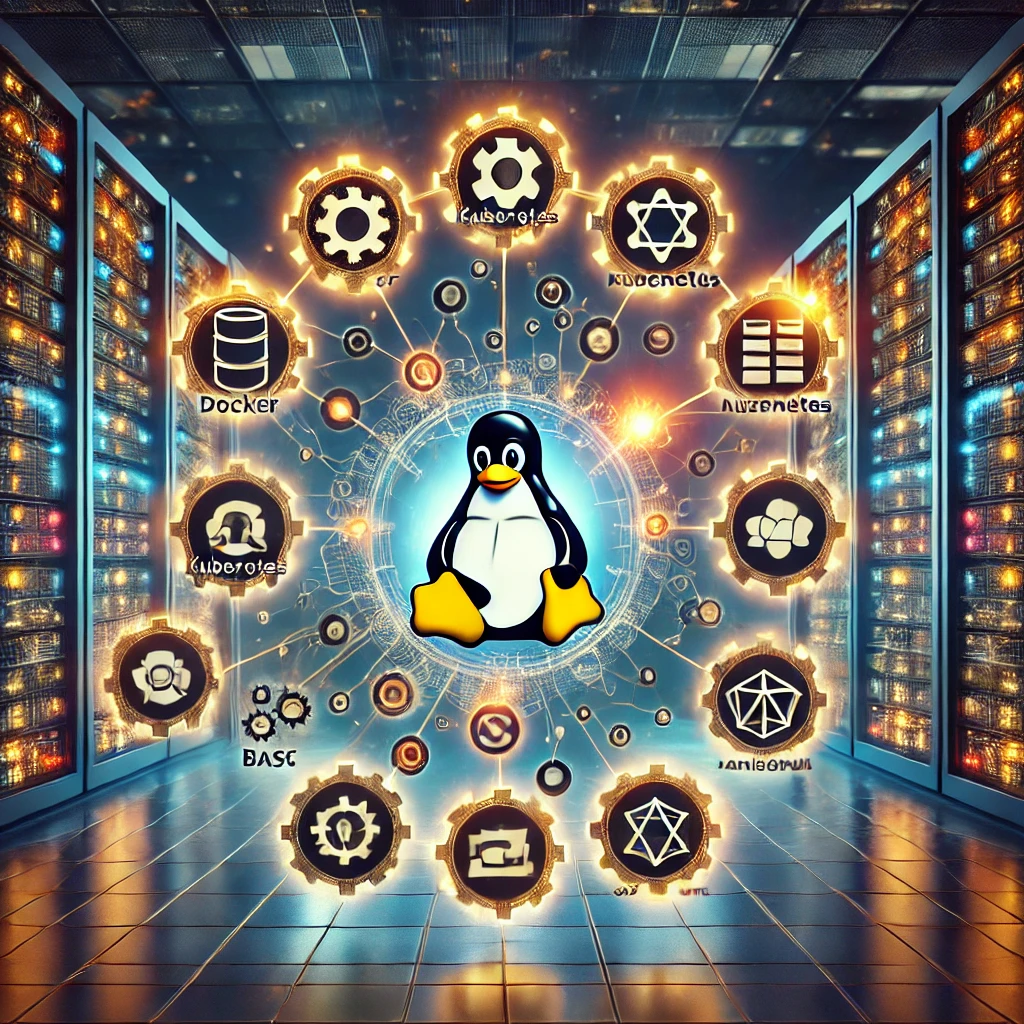Linux as the Foundation: Why It's Essential
The Enigma of Linux in DevOps: A Deep Dive :-
Understanding the DevOps Landscape
- DevOps, a portmanteau of "development" and "operations," represents a cultural shift in software development. It emphasizes collaboration, automation, and continuous delivery. Efficient DevOps practices require robust infrastructure, and Linux plays a pivotal role.
- Imagine a world without automated deployments, rapid feedback loops, and seamless scalability. That's the pre-DevOps reality. DevOps seeks to address the traditional silos between development and operations teams, fostering agility and speed in software delivery. This efficiency is greatly enhanced by the use of Linux, which provides a powerful and flexible foundation for the underlying infrastructure.
Linux as the Foundation: Why It's Essential :-
- Linux's open-source nature, coupled with its stability and flexibility, makes it the preferred operating system for most DevOps environments. Its versatility allows for customization and adaptation to specific needs, a critical requirement for efficient automation and orchestration.
- The open-source community surrounding Linux guarantees constant updates, bug fixes, and improvements, ensuring high reliability and security. Consider the costs associated with proprietary systems: Licensing fees, limited customization, and vendor lock-in can significantly hinder operational agility. Linux eliminates these hurdles, making it a cost-effective and powerful choice.
Core Linux Concepts for DevOps Engineers :-
The Command Line Interface (CLI)
- Mastery of the command line interface (CLI) is paramount for any DevOps engineer. It's the gateway to interacting directly with the operating system, allowing for efficient task automation and system administration. Commands like
ls,cd,grep, andfindare essential tools for navigation, searching, and manipulation of files and directories. - Beyond basic navigation, the CLI enables powerful scripting and automation. Imagine using a simple script to automate the deployment of a new application – this level of control and efficiency is only achievable through CLI expertise. Think of it as the brain of the DevOps engine – fluent command-line interaction ensures precise control.
File System Navigation and Management :-
- Understanding Linux's file system hierarchy is fundamental. Knowing how files and directories are organized, permissions are set, and data is stored is essential for efficient operations. This includes tasks like creating, deleting, copying, and moving files and directories using commands like
cp,mv,rm, andmkdir. - Effective management ensures data integrity and security. Imagine misconfiguring file permissions – the potential consequences, ranging from data breaches to application malfunctions, are significant. DevOps engineers are responsible for maintaining data integrity, requiring a strong grasp of file system navigation and management.
Process Management and Control :-
- Linux provides robust tools for managing running processes. Understanding how to monitor, control, and kill processes is critical for system stability and responsiveness. Commands like
ps,top, andkillare frequently used to oversee resource usage, identify bottlenecks, and handle issues. - Efficient process management directly impacts application performance and resource utilization. A DevOps engineer needs to be able to identify runaway processes, manage resource allocation, and ensure application stability, often under pressure. This requires understanding system processes thoroughly.
Networking Fundamentals :-
- A solid understanding of networking is crucial in DevOps. This involves concepts like IP addressing, routing, firewalls, and network security. Commands like
ifconfig,netstat, andiptablesare used for configuring network interfaces and managing network traffic. - Consider the complexities of a distributed microservices architecture. Understanding network protocols and configurations is vital for ensuring seamless communication between different components. Effective networking management ensures application accessibility and resilience.
User and Group Management :-
- Controlling access to system resources is a key aspect of security. DevOps engineers need to understand how to create, manage, and control user accounts and groups. This involves using commands like
useradd,usermod, andgroupadd. - Security is paramount. Improper user management can lead to vulnerabilities and potential breaches. A robust security posture necessitates the expertise to implement and enforce access controls effectively.
Shell Scripting and Automation :-
- Shell scripting is a powerful tool for automation in DevOps. By writing scripts, engineers can automate repetitive tasks, improving efficiency and reducing errors. This involves using shell scripting languages like Bash to create scripts that perform various functions.
- Automation through shell scripting is the cornerstone of efficiency in DevOps. Imagine manually deploying updates to multiple servers – it's time-consuming and prone to errors. Automation minimizes human intervention, leading to faster deployments and improved reliability.
Essential DevOps Tools Built on Linux :-
Docker and Containerization
- Docker, a containerization platform, simplifies application deployment and management. It packages applications and their dependencies into containers, ensuring consistent execution across different environments. Docker relies heavily on Linux's kernel features for its functionality.
- Docker fundamentally changes how applications are deployed and managed. The benefits include portability, scalability, and improved resource utilization. Containers offer a lightweight, efficient approach to application packaging and deployment, directly impacting development velocity.
Kubernetes for Orchestration :-
- Kubernetes is an orchestration platform designed to manage containerized applications. It automates deployment, scaling, and management of containerized workloads across clusters of machines. Kubernetes is often deployed on Linux-based systems.
- Kubernetes orchestrates complex deployments, ensuring high availability and scalability. It manages containers automatically, allowing DevOps teams to focus on application development and less on infrastructure management. Imagine managing hundreds of containers manually; Kubernetes makes this incredibly efficient.
Ansible for Configuration Management :-
- Ansible is a configuration management tool that automates infrastructure provisioning and management. It allows engineers to define desired states for servers and automatically configure them to meet those states. Ansible agents often run on Linux servers.
- Ansible significantly reduces manual effort in infrastructure management. Imagine having to manually configure every server, network setting, and application – it would be incredibly time-consuming and error-prone. Ansible streamlines this, ensuring consistency and reliability.
Jenkins for Continuous Integration/Continuous Deployment (CI/CD) :-
- Jenkins is a popular CI/CD tool that automates the software development lifecycle. It automates tasks like building, testing, and deploying software. Jenkins is often run on Linux-based servers.
- Jenkins ensures rapid feedback loops and faster delivery cycles. Imagine waiting days or weeks for deployments – it hampers innovation and slows down development. Jenkins automates this process, enabling continuous integration and deployment, leading to faster release cycles and quicker iterations.
Real-World Applications and Case Studies :-
- Numerous real-world examples showcase Linux's importance in DevOps. Large-scale applications, cloud platforms, and microservices architectures heavily rely on Linux for their underlying infrastructure. Consider companies like Google, Amazon, and Netflix; their success is partly due to robust DevOps practices built upon Linux.
- These case studies highlight the benefits of choosing Linux as a foundation for DevOps: cost savings, increased agility, improved security, and enhanced scalability. These are not just theoretical advantages, they directly translate to tangible gains in business outcomes.
Advanced Linux Techniques for DevOps Mastery :-
System Monitoring and Logging
- Effective system monitoring and logging are critical for identifying and resolving issues promptly. DevOps engineers use tools like
systemd,journalctl, andsyslogto monitor system events and logs. Understanding log analysis is critical for troubleshooting. - Imagine a production system failing without adequate logging – debugging becomes a nightmare. Comprehensive monitoring and insightful log analysis help identify potential issues before they impact users. Proactive issue identification and resolution is a hallmark of mature DevOps practices.
Security Hardening and Best Practices :-
- Securing Linux systems is vital for protecting sensitive data and applications. DevOps engineers need to implement security measures such as firewalls, intrusion detection systems, and regular security audits. This involves staying updated on security vulnerabilities and implementing appropriate patches.
- Security is an ongoing process, not a one-time fix. Regular security audits, vulnerability scanning, and patch management are crucial to maintaining a robust security posture. Ignoring security best practices can lead to costly breaches and damage to reputation.
Troubleshooting and Debugging :-
- Troubleshooting and debugging are essential skills for any DevOps engineer. This involves systematically identifying and resolving issues, leveraging tools like
strace,ltrace, and debuggers. Effective debugging requires understanding the system architecture and relevant logs. - Effective troubleshooting is crucial for maintaining system uptime and resolving issues rapidly. A DevOps engineer should have the skills to pinpoint the root cause of problems and implement effective solutions, often under pressure.
Performance Optimization :-
- Optimizing system performance is crucial for efficiency and scalability. DevOps engineers leverage tools and techniques to identify performance bottlenecks and improve overall system responsiveness. This involves understanding system resource utilization, tuning kernel parameters, and optimizing application code.
- Performance optimization directly impacts user experience and operational costs. Identifying and resolving performance bottlenecks leads to cost savings and improved responsiveness. Continuously monitoring and improving system performance is key to maintaining a high-performing environment.
The Future of Linux in DevOps :-
- Linux will continue to play a central role in the DevOps landscape. The open-source nature, flexibility, and vast community support ensure its continued relevance. As DevOps practices evolve, Linux will adapt and continue to provide a robust foundation for automated, scalable, and secure infrastructure.
- The future of DevOps is intrinsically linked to the ongoing development and innovation within the Linux ecosystem. New technologies and tools will continue to emerge, further strengthening Linux's position as a cornerstone of modern software delivery.
Review
Kalpesh Shewale
I am grateful to have completed my Full Stack Development with AI course at Apnaguru. The faculty's support and interactive classes helped me discover my potential and shape a positive future. Their guidance led to my successful placement, and I highly recommend this institute.
Kalpesh Shewale
I am grateful to have completed the Full Stack Development with AI course at Apnaguru. The faculty's dedicated support and hands-on approach during the classes enabled me to unlock my potential and shape a promising future. Their guidance helped me secure a placement with a good package. I highly recommend this course, and for those interested, I also suggest doing the offline version at the center for an enhanced learning experience.

Raveesh Rajput
Completing the Full Stack Development with AI course at Apnaguru was a game-changer for me. I secured an internship through this course, which gave me invaluable hands-on experience. I strongly recommend this course to anyone looking to break into the tech industry. For the best experience, I suggest attending the offline sessions at the center, where the interactive learning environment really enhances the overall experience.

swapnil shinde
Apnaguru’s Full Stack Development with AI course provided me with more than just knowledge—it opened doors to an internship that gave me real-world, hands-on experience. If you're serious about a career in tech, this course is a must. I highly recommend attending the offline sessions for the most immersive and interactive learning experience!
Kalpana Waghmare
I recently completed the Full Stack Developer with AI course on ApnaGuru, and I couldn’t be more impressed! The structure of the course, with well-organized topics and self-assessment MCQs after each section, really helped reinforce my learning. The assignments were particularly valuable, allowing me to apply what I learned in a practical way. Overall, it’s an excellent program that effectively combines full-stack development and AI concepts. Highly recommended for anyone looking to enhance their skills!
Completing the Full Stack Development with AI course at Apnaguru was a pivotal moment in my career. It not only deepened my understanding of cutting-edge technologies but also directly led to an internship that provided practical, real-world experience. If you're aiming to enter the tech field, this course is an excellent stepping stone. I especially recommend attending the in-person sessions at the center, where the dynamic, hands-on learning approach truly maximizes the benefits of the program.

Mahesh Bhosle
I completed the Full Stack Development course at Apnaguru, and it was a valuable experience. The focus on live assignments and projects gave me real-world insights, helping me apply my skills in a professional setting. The interactive live sessions, mock interviews, and question banks were excellent for job preparation. Apnaguru’s company-like environment also helped me get accustomed to real work dynamics. Overall, this course equipped me with the skills and confidence needed for a career in full-stack development. I highly recommend it to anyone seeking hands-on learning and industry relevance.
I recently completed the Full Stack course at ApnaGuru, and I’m genuinely impressed! The curriculum is well-structured, covering both front-end and back-end technologies comprehensively. The instructors are knowledgeable and provide hands-on experience through practical projects. The supportive community and resources available made learning enjoyable and engaging. Overall, it’s a great choice for anyone looking to kickstart a career in web development. Highly recommend!

Adarsh Ovhal
I recently participated in the Full Stack Development With AI Course program, and it has been incredibly beneficial. The guidance I received was tailored to my individual needs, thanks to their advanced use of AI tools. The Trainers were knowledgeable and supportive, helping me explore various educational and career paths. The resources and workshops provided were practical and insightful, making my decision-making process much clearer. Overall, I highly recommend this program to any student looking for IT Field and personalized career guidance!
Shirish Panchal
I’m currently pursuing the Full Stack Developer with AI course at ApnaGuru Training Center, and I'm impressed with what I've experienced so far. The curriculum is well-structured, covering key concepts in both front-end and back-end development, along with AI fundamentals. The instructors are knowledgeable and supportive, which makes it easy to engage and ask questions. I particularly appreciate the hands-on projects that help reinforce what I’m learning. While I’m still in the process of completing the course, I feel that I'm building a strong foundation for my future in tech. I would recommend ApnaGuru to anyone looking to explore full stack development with AI!
Apnaguru Training Center stands out as a top-notch institute for IT education. They provide a wide array of courses, including Full Stack Development, Java Full Stack, Python, Automation Testing, DevOps, and MERN/MEAN Stack, all designed to meet the demands of the modern tech industry.

Mahesh Bhosle
Apnaguru Training Center is a fantastic place for IT education! They offer a variety of courses, including Full Stack Development, Java Full Stack, and Python, all taught by knowledgeable instructors who are committed to student success. The curriculum is up-to-date and includes hands-on projects that enhance learning.
dandewar srikanth
I had an excellent experience with the full-stack web development program at APNAGURU. The instructor had in-depth knowledge of both frontend and backend technologies, which made the concepts easy to grasp. From working on HTML, CSS, JavaScript, and React for the frontend to Node.js and MongoDB for the backend, the learning curve was very smooth.
